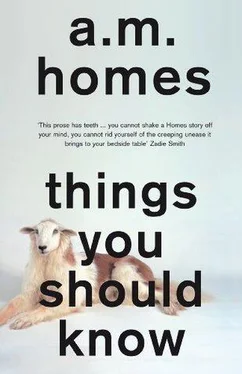A. M. Homes
Things You Should Know
In Memory of Robert S. Jones
I am walking, holding a small screen, watching the green dot move like the blip of a plane, the blink of a ship’s radar. Searching. I am on the lookout for submarines. I am an air traffic controller trying to keep everything at the right distance. I am lost.
A man steps out of the darkness onto the sidewalk. “Plane gone down?” he asks.
It is nearly night; the sky is still blue at the top, but it is dark down here.
“I was just walking the dog,” he says.
I nod. The dog is nowhere to be seen.
“You’re not from around here are you?”
“Not originally,” I say. “But we’re over on Maple now.”
“Tierney,” the man says. “John Tierney.”
“Harris,” I say. “Geordie Harris.”
“Welcome to the neighborhood. Welcome to town.”
He points to my screen; the dot seems to have stopped traveling.
“I was hoping to hell that was a toy — a remote control,” he says. “I was hoping to have some fun. Are you driving a car or floating a boat somewhere around here?”
“It’s a chip,” I say, cutting him off. “A global positioning screen. I’m looking for my mother-in-law.”
There is a scratching sound from inside a nearby privet, and the unmistakable scent of dog shit rises like smoke.
“Good boy,” Tierney says. “He doesn’t like to do his business in public. Can’t blame him — if they had me shitting outside, I’d hide in the bushes too.”
Tierney — I hear it like tyranny. Tyrant, teaser, taunting me about my tracking system, my lost mother-in-law.
“It’s not a game,” I say, looking down at the blinking green dot.
A yellow Lab pushes out of the bushes and Tierney clips the leash back onto his collar. “Let’s go, boy,” Tierney says, slapping the side of his leg. “Good luck,” he calls, pulling the dog down the road.
The cell phone clipped to my belt rings. “Who was that?” Susan asks. “Was that someone you know?”
‘It was a stranger, a total stranger, looking for a playmate.” I glance down at the screen. “She doesn’t seem to be moving now.”
“Is your antenna up?” Susan asks.
There is a pause. I hear her talking to Kate. “See Daddy. See Daddy across the street, wave to Daddy. Kate’s waving,” she tells me. I stare across the road at the black Volvo idling by the curb. With my free hand I wave back.
“That’s Daddy,” Susan says, handing Kate the phone.
“What are you doing, Daddy?” Kate asks. Her intonation, her annoyance, oddly accusatory for a three-year-old.
“I’m looking for Grandma.”
“Me too,” Kate giggles.
“Give the phone to Mommy.”
“I don’t think so,” Kate says.
“Bye, Kate.”
“What’s new?” Kate says — it’s her latest phrase.
“Bye-bye,” I say, hanging up on her.
I step off the sidewalk and dart between the houses, through the grass alley that separates one man’s yard from another’s. A sneak, a thief, a prowling trespasser, I pull my flashlight out of my jacket and flick it on. The narrow Ever-`Ready beam catches patios and planters and picnic tables by surprise. I am afraid to call out, to attract attention. Ahead of me there is a basketball court, a slide, a sandbox, and there she is, sailing through my beam like an apparition. Her black hair blowing, her hands smoothly clutching the chain-link ropes of the swing as though they were reins. I catch her in mid-flight. Legs swinging in and out. I hold the light on her — there and gone.
“I’m flying,” she says, sailing through the night.
I step in close so that she has to stop swinging. “Did you have a pleasant flight, Mrs. Ha?”
“It was nice.”
“Was there a movie?”
She eases herself off the swing and looks at me like I’m crazy. She looks down at the tracking device. “It’s no game,” Mrs. Ha says, putting her arm through mine. I lead her back through the woods. “What’s for dinner, Georgie?” she says. And I hear the invisible echo of Susan’s voice correcting — it’s not Georgie, it’s Geordie.
“What would you like, Mrs. Ha?”
In the distance, a fat man presses against a sliding glass door, looking out at us, his breath fogging the pane.
Susan is at the computer, drawing. She is making a map, a grid of the neighborhood. She is giving us something to go on in the future — coordinates.
She is an architect, everything is line, everything is order. Our house is G4. The blue light of the screen pours over her, pressing the flat planes of her face flatter still — illuminating. She hovers in an eerie blue glow.
“I called Ken,” I say.
Ken is the one who had the chip put in. He is Susan’s brother. When Mrs. Ha was sedated for a colonoscopy, Ken had the chip implanted at the bottom of her neck, above her shoulder blades. The chip company specialist came and stood by while a plastic surgeon inserted it just under the skin. Before they let her go home, they tested it by wheeling her gurney all over the hospital while Ken sat in the waiting room tracking her on the small screen.
“Why?”
“I called him about her memory. I was wondering if we should increase her medication.”
Ken is a psychopharmacologist, a specialist in the containment of feeling. He used to be a stoner and now he is a shrink. He has no affect, no emotions.
“And?” she says.
“He asked if she seemed agitated.”
“She seems perfectly happy,” Susan says.
“I know,” I say, not telling Susan what I told Ken — Susan is the one who’s agitated.
“Does she know where she is?” Ken had asked. There had been a pause, a moment where I wondered if he was asking about Susan or his mother. “I’m not always sure,” I’d said, failing to differentiate.
“Well, what did he say?” Susan wants to know.
“He said we could try upping the dose — no harm in trying. He said it’s not unusual for old people to wander off at twilight, to forget where they are. He said there are all kinds of phenomena that no one really understands.”
“You haven’t ever called my brother before, have you?” Susan asks.
“I have not, no.”
Mrs. Ha has only been with us for three weeks. Before that, she was in her own apartment in California, slowly evaporating. It was a fall that brought her to the hospital, a phone call to Ken, a series of tests, the chip implant, and then Ken put her on a plane to us — with a pair of tracking devices packed in her suitcase. When she arrived I drove her around the neighborhood, I showed her where the stores were, the library, post office, and the train station. I don’t tell Susan that now I live in fear Mrs. Ha will find the station herself, that she’ll hop on a train — and the mother hunt will become an FBI investigation. We have only been here ourselves for five months, before that we were on 106th and Riverside, and most mornings when I wake up I still have no idea where I am.
“I don’t like coming home any more,” Susan says, turning to face me, the light from the computer an iMac aura around her head. “It scares me. I never know what to expect.” She pauses. “I can’t do it.”
“You can do it,” I say, plucking a fragment from my childhood, the memory of Shari Lewis telling Lamb Chop, “You can do anything.”
There is nothing Susan likes less than to fail. She will do anything not to fail; she will not try so as not to fail.
Susan is reading. She turns the pages of her book, neatly, tightly, they almost click as they flip. “Listen to this,” she says, quoting a passage from In Cold Blood. “‘Isn’t it wonderful, Kansas is so American.’”
Читать дальше












